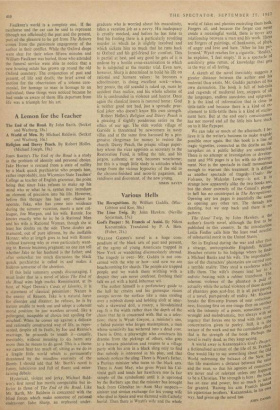Various Hells
The Recognitions. By William Gaddis. (Mac- Gibbon and Kee, 30s.) The Lime Twig. By John Hawkes. (Neville Spearman, 15s.) God's Pauper : St. Francis of Assisi. By Nikos Kazantzakis. Translated by P. A. Bien. (Faber, 21s.) WILLIAM GADDIS'S novel is a huge com- pendium of the black arts of past and present, of the agony of young Americans trapped in New York or wandering disconsolately abroad. The tragedy is over—Mr. Gaddis is not con- cerned with the why or how—and now we are beachcombing for shards. The people are trapped people and we watch them writhing with a despair they can never confront, frothing their talk on art with a hard, inhuman wit.
The author himself is a perfunctory guide to the hell he creates and his grotesque vision sweeps across the surface like a man striding over a rubbish dump and holding aloft at inter- vals a skewered doll, a rosary, a bloodstained rag. It is the width rather than the depth of the chaos that he is concerned with. But as a selec- tion: there is Wyatt Gwyon, a minister's son,
failed painter who forges masterpieces, a man whose sensitivity has withered into a dead core. There is Otto, a playwright who constructs his dramas from the pickings of others, who goes to a banana plantation and returns to a village party with his arm in a black sling only to find that nobody is interested in his play, and that nobody notices the sling. There is Wyatt's father, a Puritan minister who turns to the black arts. There is Aunt May, who gives Wyatt his Cal- vinist guilt and tends her hawthorn tree (a fair sample of the symbolism) until it is uprooted by the Barbary ape that the minister has brought back from Gibraltar in—Aunt May suspects— sinister and simian exchange for his young wife who died in Spain and was damned with Catholic burial. Then there is Wyatt's wife and the whole
SPECTATOR. SEPTEMBER 21, 1962 world of fakes and phonies encircling them both. Forgers all, and because the forger can never create a meaningful world, there is never anY relationship between a man and his work. There are forgers of paintings, of banknotes, of plays, of anger and love and hate. `After he has per- formed,' Wyatt reaches for a cigarette: `Reality: he explains, 'I feel empty.' It is a spectacle of sensitivity gone rotten, of knowledge that gets in the way of all feeling.
A sketch of the novel inevitably suggests a greater distance between the author and his material than exists. Mr. Gaddis partakes of his own damnation. The book is full of bob-tails and rag-ends of medieval lore, snippets of all the languages, endless anecdotes and epigrams. It is the kind of information that is close to tittle-tattle and because there is a kind of ex- citement to tittle-tattle there is a kind of excite- ment here. But at the end one's consciousness has not moved and all the little bits have stuck on to it like flypaper.
We can take so much of the aftermath. I be- lieve it is the writer's business to make tragedy possible once again. But this book is a line of tragic vignettes, connected as the deaths on the turnpikes on a public holiday are connected. There is no attempt at investigation or develop- ment and 956 pages is a lot with no develop- ment. Nor is the spectacle in itself momentous enough to warrant this treatment. It is diffuse as another spectacle of tragedy—Under the Volcano, by Malcolm Lowry—is not. It is strange how apparently alike the two books are, but the sheer enormity of the Consul's plunge to hell has no counterpart in The Recognitions. Opening any ten pages is essentially the same as opening any other ten. The threads are dazzling, but we step back and there is no pattern. The Lime Twig, by John Hawkes, is the author's fourth novel, although the first to be published in this country. In the introduction Leslie Fiedler calls him 'the least read novelist of substantial merit in the United States.'
Set in England during the war and after (but a strange, unrecognisable England), William Hencher returns to his lodgings where he finds a Michael Banks and his wife. The improbabili- ties of the characters' phantasies are carried into a terrible reality. They steal a racehorse which kills them. The wife's dreams lead her to a sadistic beating with a rubber truncheon. The inherent violence of the phantasy is Paid in actuality while the actual violence of those devoid of phantasy goes scot-free. It is all part-parody of a novel, part-parody of reality. Mr. l-fawkes breaks the film-strip frames of neat conscious- ness, focusing first on one image then on another with the intensity of a poem, sometimes over- wrought and melodramatic, but always with an urgency that forces one to read with the same concentration given to poetry. Still, it is the “. texture of the work and not the cumulative effect that is the strength of the book. Perhaps the novel is really dead, as they keep saying- ef. A world away is Kazantzakis's God's PaliP. a fictionalised account of the life of St. Francis. One would like to say something about the Ole World redressing the balance of the New, but are never this life maintains a distance between the salc"` eheverrna boo.. rena, so or relevantat gtomnlieesss of Conscience to be a Christian. The strength is here: the
has an ease and power, but so much is ta" for granted. `Raising his arm Francis bless`,.,
crrtu his equestrian brothers.' Kazantzakis, in his °o way, had given up the novel too.
JOHN pArlIEL










































 Previous page
Previous page